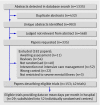Use of intensive case management to reduce time in hospital in people with severe mental illness: systematic review and meta-regression
- PMID: 17631513
- PMCID: PMC1949434
- DOI: 10.1136/bmj.39251.599259.55
Use of intensive case management to reduce time in hospital in people with severe mental illness: systematic review and meta-regression
Abstract
Objectives: To explain why clinical trials of intensive case management for people with severe mental illness show such inconsistent effects on the use of hospital care.
Design: Systematic review with meta-regression techniques applied to data from randomised controlled trials.
Data sources: Cochrane central register of controlled trials, CINAHL, Embase, Medline, and PsychINFO databases from inception to January 2007. Additional anonymised data on patients were obtained for multicentre trials.
Review methods: Included trials examined intensive case management compared with standard care or low intensity case management for people with severe mental illness living in the community. We used a fidelity scale to rate adherence to the model of assertive community treatment. Multicentre trials were disaggregated into individual centres with fidelity data specific for each centre. A multivariate meta-regression used mean days per month in hospital as the dependent variable.
Results: We identified 1335 abstracts with a total of 5961 participants. Of these, 49 were eligible and 29 provided appropriate data. Trials with high hospital use at baseline (before the trial) or in the control group were more likely to find that intensive case management reduced the use of hospital care (coefficient -0.23, 95% confidence interval -0.36 to -0.09, for hospital use at baseline; -0.44, -0.57 to -0.31, for hospital use in control groups). Case management teams organised according to the model of assertive community treatment were more likely to reduce the use of hospital care (coefficient -0.31, -0.59 to -0.03), but this finding was less robust in sensitivity analyses and was not found for staffing levels recommended for assertive community treatment.
Conclusions: Intensive case management works best when participants tend to use a lot of hospital care and less well when they do not. When hospital use is high, intensive case management can reduce it, but it is less successful when hospital use is already low. The benefits of intensive case management might be marginal in settings that have already achieved low rates of bed use, and team organisation is more important than the details of staffing. It might not be necessary to apply the full model of assertive community treatment to achieve reductions in inpatient care.
Conflict of interest statement
Figures





Comment in
-
Assertive community treatment in psychiatry.BMJ. 2007 Aug 18;335(7615):311-2. doi: 10.1136/bmj.39293.687674.AD. BMJ. 2007. PMID: 17703004 Free PMC article.
-
Review: effectiveness of intensive case management for severe mental illness depends on baseline hospital use and organisation.Evid Based Nurs. 2008 Jan;11(1):19. doi: 10.1136/ebn.11.1.19. Evid Based Nurs. 2008. PMID: 18192524 No abstract available.
-
Review: intensive case management for severe mental illness reduces rehospitalisation when previous hospital use has been high.Evid Based Ment Health. 2008 May;11(2):45. doi: 10.1136/ebmh.11.2.45. Evid Based Ment Health. 2008. PMID: 18441134 No abstract available.
References
-
- NASHMPD Research Institute. Implementation of evidence-based services by state mental health authorities. Community Support Network News 1997;11:3-5.
-
- Bond GR, Drake RE, Mueser KT, Latimer E. Assertive community treatment for people with severe mental illness: critical ingredients and impact on patients. Dis Manag Health Outcomes 2001;9:141-59.
-
- Burns T, Fioritti A, Holloway F, Malm U, Rossler W. Case management and assertive community treatment in Europe. Psychiatr Serv 2001;52:631-36. - PubMed
-
- Department of Health. A national service framework for mental health London: Department of Health, 1999
-
- Holloway F. Case management for the mentally ill: looking at the evidence. Int J Soc Psychiatry 1991;37:2-13. - PubMed
Publication types
MeSH terms
LinkOut - more resources
Full Text Sources
Medical
